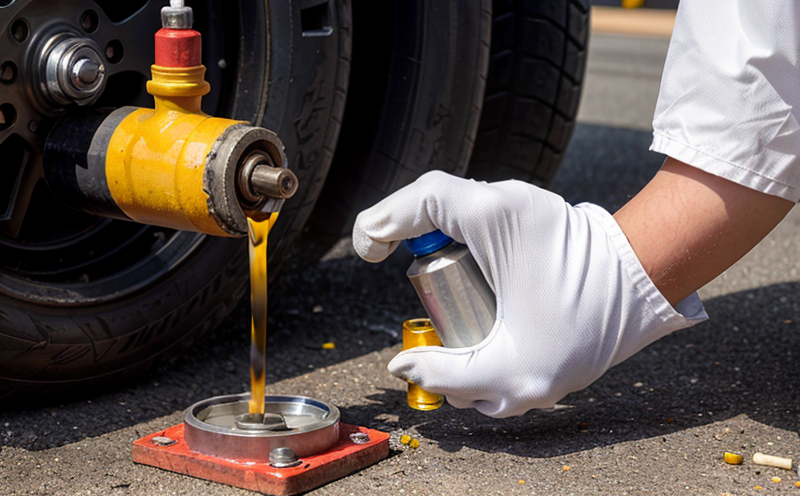ASTM D7418 Volatility Testing of Lubricants
The ASTM D7418 volatility testing procedure is a critical tool in ensuring the quality and performance of lubricants used in marine equipment. This test assesses the volatile fraction content, which can impact the lubricant's ability to provide adequate protection against wear and corrosion under varying operating conditions.
Volatility is measured by distilling a sample of the lubricant at 100°C until the distillate volume reaches 95% of the original sample. The remaining residual fraction provides insights into the base oil composition, additives, and other components that contribute to the overall performance characteristics of the lubricant.
The ASTM D7418 test is particularly important for marine environments where lubricants are subjected to extreme conditions such as high temperatures, saltwater exposure, and varying pressures. Understanding the volatility profile helps in selecting lubricants that can maintain their stability and effectiveness throughout the operational life cycle of marine equipment.
For quality managers and compliance officers, this test is essential for ensuring adherence to industry standards and regulatory requirements. For R&D engineers, it provides valuable data on how different formulations impact performance under specific conditions. Procurement professionals benefit from this information when specifying lubricants that meet the stringent demands of maritime applications.
The ASTM D7418 procedure is designed to be robust and reproducible, with clear guidelines for sample preparation and analysis. It aligns closely with international standards such as ISO 6905-1 and EN 23955, ensuring that results are comparable across different laboratories and geographies.
By performing ASTM D7418 testing, manufacturers can enhance the reliability of their lubricants, thereby improving the overall performance and lifespan of marine equipment. This is particularly crucial in sectors where downtime can lead to significant operational disruptions and increased costs.
Why It Matters
Volatility testing using ASTM D7418 is not just a procedural requirement; it plays a vital role in ensuring the safety, efficiency, and longevity of marine equipment. The volatility profile of lubricants directly affects their ability to provide effective protection against wear and corrosion.
- Enhanced Safety: Lubricants with an optimal volatility profile reduce the risk of fires and other hazards associated with volatile components in marine environments.
- Better Efficiency: By minimizing losses due to evaporation, lubricants can maintain their intended properties longer, leading to more efficient operation of machinery.
- Extended Lifespan: Understanding the volatility characteristics helps in selecting lubricants that are better suited to withstand harsh conditions, thus extending the lifespan of marine equipment.
In summary, ASTM D7418 testing is essential for maintaining a balance between performance and safety, which is critical in the challenging conditions faced by marine equipment.
Industry Applications
The ASTM D7418 volatility test finds extensive application in various sectors within the maritime industry. These include:
- Cruise Ships: Ensuring lubricants that can withstand the high temperatures and saltwater exposure common on cruise ships.
- Oil Tankers: Selecting lubricants capable of maintaining their properties under extreme pressure and temperature fluctuations.
- Fishing Vessels: Providing reliable lubrication in cold and fluctuating environmental conditions.
In addition to these, the test is crucial for any organization involved in the design, maintenance, or operation of marine equipment. By adhering to ASTM D7418 standards, companies can ensure that their lubricants meet the highest quality benchmarks, thereby enhancing operational efficiency and safety.
Why Choose This Test
- Comprehensive Analysis: Provides a detailed understanding of the volatile fraction content in lubricants.
- Industry Recognition: Widely accepted by regulatory bodies and industry standards organizations.
- Standardized Procedure: Ensures consistent results across different laboratories and geographies.
- Data-Driven Decision Making: Offers actionable insights for quality control and product development.
- Regulatory Compliance: Helps in meeting stringent industry regulations and standards.
Choosing ASTM D7418 volatility testing ensures that the lubricants used meet the highest quality benchmarks, thereby enhancing operational efficiency and safety. This test is a cornerstone for maintaining reliability and performance in marine equipment across diverse applications.





